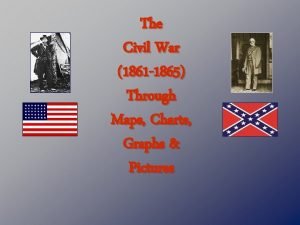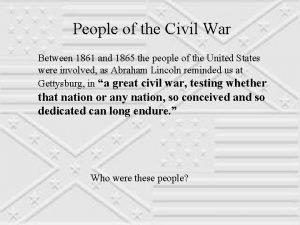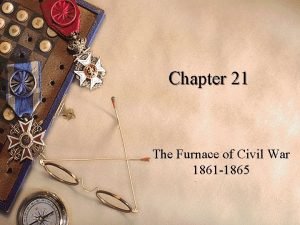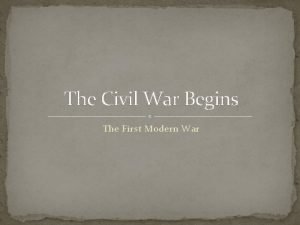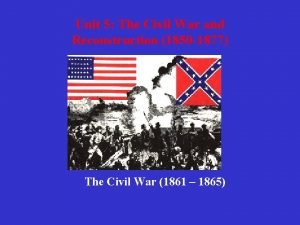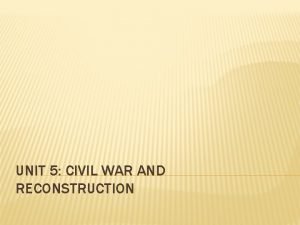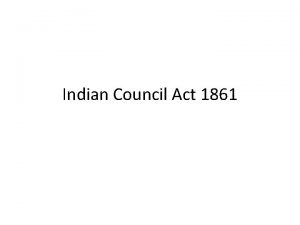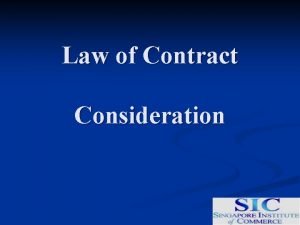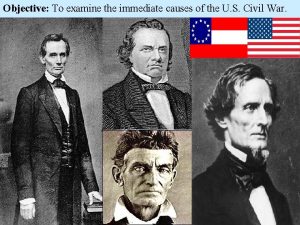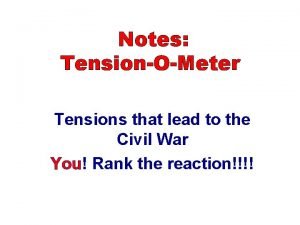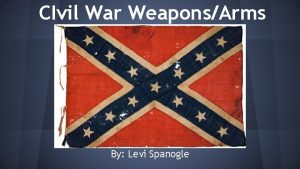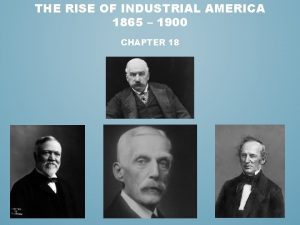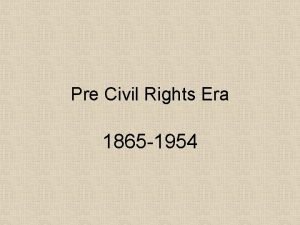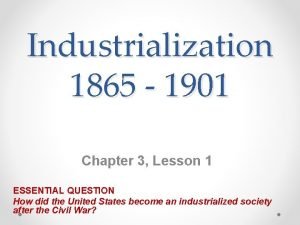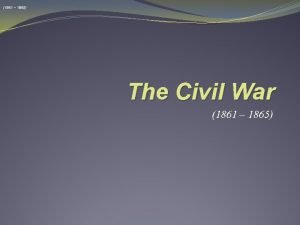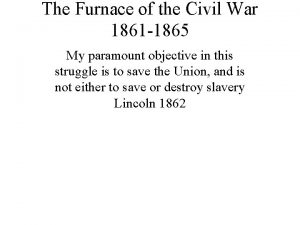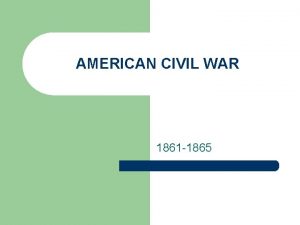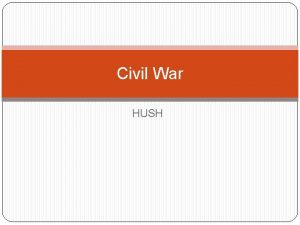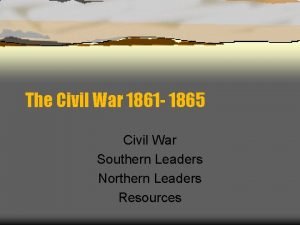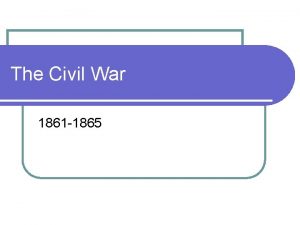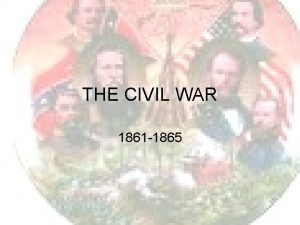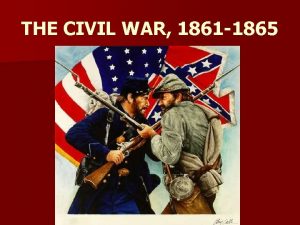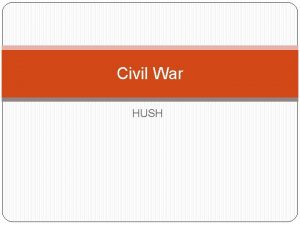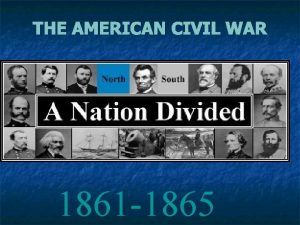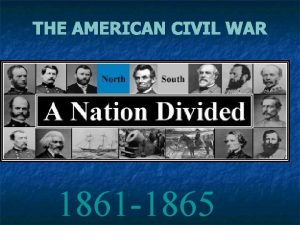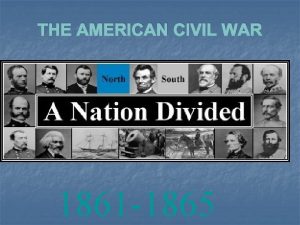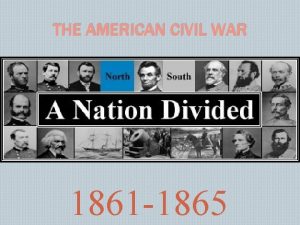The Furnace of Civil War 1861 1865 Unit























- Slides: 23

The Furnace of Civil War 1861 -1865 Unit 6: Civil War and Reconstruction

Chapter Themes • The Civil War, begun as a limited struggle over the Union, eventually became a total war to end slavery and transform the nation • After several years of seesaw struggle, the Union armies under Ulysses Grant finally wore down the Southern forces under Robert E. Lee and ended the Confederate bid for independence, as well as the institution of slavery

A Quick War • Lincoln expected a quick victory • Battle of Bull Run July 21, 1861 – Inexperience – Defeat – Strengthened Northern resolve

Peninsula Campaign • Union commander – George Mc. Clellan – Cocky, drillmaster, perfectionist, conservative • Peninsular Campaign – waterborne attack on Richmond – unsuccessful

Anaconda Plan • Blockade southern coasts • Liberate slaves to undermine Southern economy • Seize control of the Mississippi River to cut confederacy in half • Send troops into Georgia and Carolinas • Capture Richmond • Engage the enemy everywhere

Threats to the Blockade • Blockade running is profitable, risky • Northern use of high handed practices to enforce blockade • Merrimack and Monitor battle of the ironclads

Antietam • Second Battle of Bull Run – Confederate victory, Lee push into Maryland • Antietam – Return of Mc. Clellan – Draw, but Lee withdraws – Removal of Mc. Clellan

The Emancipation Proclamation • Antietam provided opportunity • Emancipation Proclamation • Declared slaves were free in Confederate states still under rebellion – Didn’t include capture states or Border states – Although it did not free any slaves many deserted to join the Union

Reaction to the Proclamation • North had varied reaction – Lincoln as savior – Abolitionists felt that Lincoln didn’t go far enough • Don’t inflict emancipation on the slaves • South view Lincoln as a fiend – European sympathy

Role of African American Soldiers • Lincoln took steps to enlist blacks in the armed forces – Union army would, at first, accept no black volunteers • By war’s end 180, 000 blacks served in the Union army – Many were from slave states • Confederacy did not enlist slaves until the very end of the war – Slaves kept southern farms going

Gettysburg • Mc. Clellan was replaced by Ambrose Burnside – Fredericksburg – resulted in wounding and death of 10, 000 Union soldiers – Replaced by Joe Hooker, who suffered defeat at Chancelorville – George Meade replaced Hooker • Gettysburg – July 1 -3, 1863 – Failure of Pickett’s charge led to decisive Union victory

The Road to Gettysburg

The Legacy of Gettysburg • Two minute Gettysburg Address • Considered insignificant at the time

The War in the West • Successes of Ulysses S. Grant – Fort Henry and Fort Donelson – Opened way to Georgia – Confederate victory at Shiloh – Vicksburg

Sherman’s March the Georgia to the Sea • Gen. William Tecumseh Sherman • Captured and the burned Atlanta beginning in September 1864 • Cut a 60 mile swath (Sherman’s march) to the sea • Aim to cut off Confederate supplies

Progress of the War 1861 -1865

Political Opposition • Congressional Committee on the Conduct of the War (formed in 1861) – Radical Republicans who resented the expansion of presidential power – Urged Lincoln towards emancipation • Northern Democrats – Tainted by association with Southern Democrats – War Democrats and Peace Democrats • Copperheads vigorously opposed the war • The Man Without a Country by Everett Hale

Election of 1864 • Union Party – Republicans and War Democrats • Lincoln’s nomination and victory were often in doubt – Military victories helped seal the election

The End of the War • Wilderness Campaign – series of battles on the way to Richmond – Blood and guts method of fighting • Capture of Richmond at Appomattox Courthouse

The Cost of War

The Deadliest War

Assassination • April 14, 1865 • Part of a larger plot • Loss for both the North and the South – Increased bitterness in the North • Andrew Johnson becomes president

The Legacy of the War • English Reform Bill of 1867 was influenced by union victory and upsurge in cause of democracy • End of slavery • How will the nation mend and rebuild the South?
 Civil war 1861/1862
Civil war 1861/1862 Civil war 1861/1862
Civil war 1861/1862 The furnace of civil war
The furnace of civil war Who shot john wilkes booth
Who shot john wilkes booth Civil war first modern war
Civil war first modern war Toward civil war lesson 3 secession and war
Toward civil war lesson 3 secession and war Unit 4: civil war and reconstruction
Unit 4: civil war and reconstruction Unit 5 civil war and reconstruction
Unit 5 civil war and reconstruction Civil war and reconstruction vocabulary
Civil war and reconstruction vocabulary Indian councils act 1861
Indian councils act 1861 Unionistička stranka 1861
Unionistička stranka 1861 Currie v misa
Currie v misa John brown poster
John brown poster Tensionometer
Tensionometer Springfield model 1861 rifle facts
Springfield model 1861 rifle facts Civil rights and civil liberties webquest
Civil rights and civil liberties webquest Urban america 1865 to 1896
Urban america 1865 to 1896 Hollywood silver fox farm v emmett
Hollywood silver fox farm v emmett The rise of industrial america 1865-1900
The rise of industrial america 1865-1900 The rise of industrial america 1865-1900
The rise of industrial america 1865-1900 1954-1865
1954-1865 Industrialization (1865 to 1901 worksheet answers key)
Industrialization (1865 to 1901 worksheet answers key) Becoming a world power 1865-1917
Becoming a world power 1865-1917 What are characteristics of impressionism
What are characteristics of impressionism
